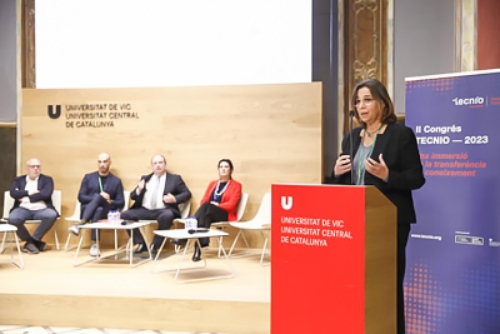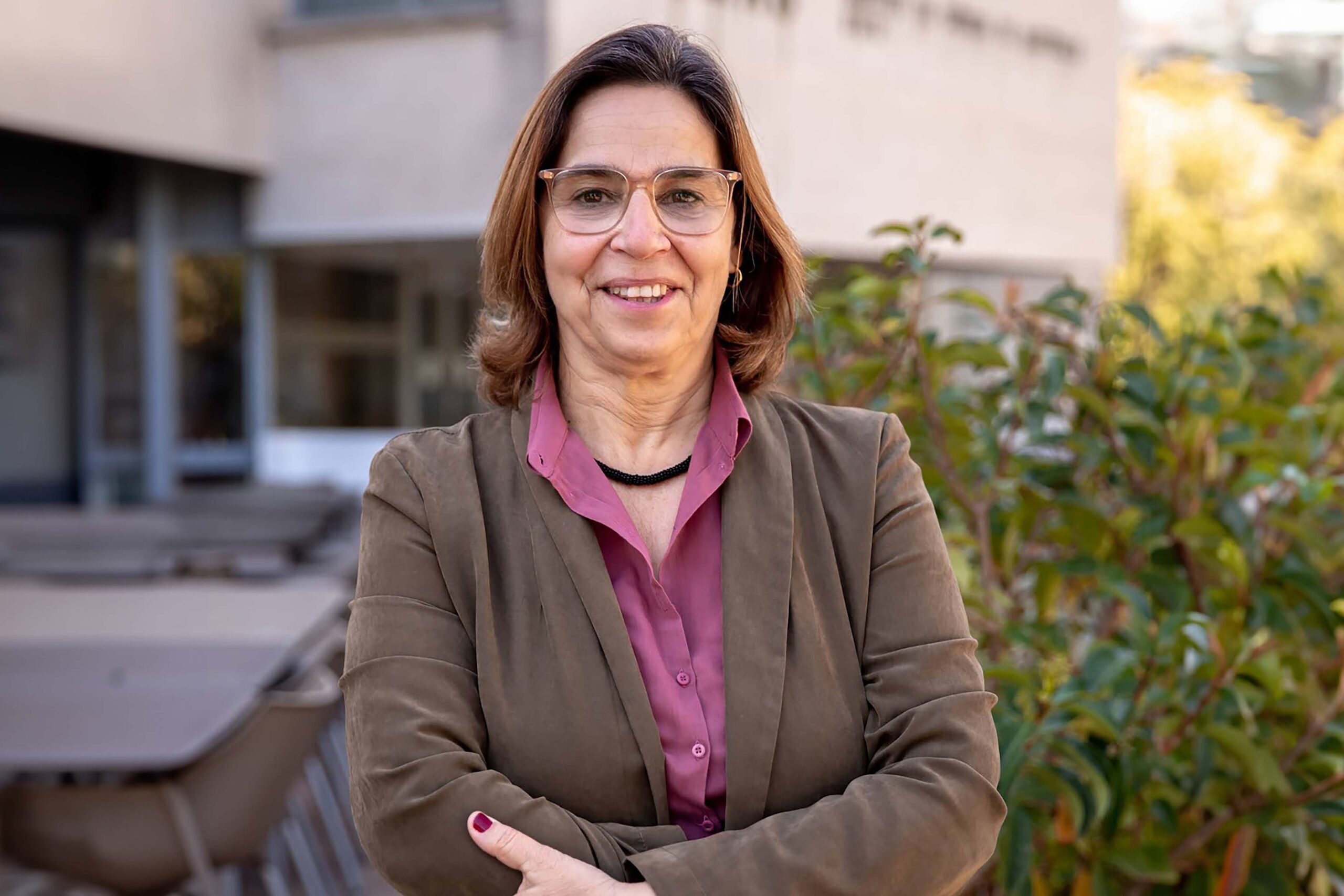The TECNIO Association unites 56 groups and research centres in Catalonia that are accredited as TECNIO agents by ACCIÓ, the Government of Catalonia Agency for Business Competitiveness. Through this seal, companies are given recognition for their contributions to the transfer of new technologies and product, service, and process innovations. IQS Tech Transfer holds a TECNIO seal through Ramón Llull University
The TECNIO association was established in 2021, under the chairmanship of Dr Nora Ventosa Rull, an IQS Chemical Engineer, research professor at the Institute of Materials Science of Barcelona (ICMAB) with the CSIC, and co-founder of the company Nanomol Technologies S.L. We spoke with Dr Nora Ventosa about TECNIO and the role of the association as a promoter of this model of excellence in the transfer of knowledge and innovation to society.
Tell us about the TECNIO Association and its mission in promoting excellence in knowledge transfer.
Our association brings together all the agents who have the TECNIO seal, awarded by ACCIÓ, which identifies the best research groups in Catalonia that also have activity in technology transfer and great collaboration with companies. The groups recognized as TECNIO agents belong to different public and private universities and research centres across the region. We became an association in 2021 to bring together all the agents distributed throughout Catalonia and give visibility to the activity of the groups with the TECNIO seal, foster collaborations, and promote them as an instrument of connection with the business sector and government.
“TECNIO gives visibility to the activity of research groups, fosters collaborations, and promotes them as an instrument of connection with the business sector and government”
We define ourselves as the “SME” of the research and technology transfer world. There are currently 56 associated groups in Catalonia, and we represent nearly all TECNIO agents. Although we do not have enough visibility individually, TECNIO agents reach great indicators as a whole. We achieved a considerable increase in our transfer activity during 2023, reaching over €72 million in invoicing to companies. Half involve collaboration projects with companies, financed by governmental entities, and the other half involve direct contracts with companies.
In concrete, the mission of our association is to promote this TECNIO model that has already proven to be a solid model for transferring the knowledge generated in universities and research centres to the business world to benefit society and people. Above all, we do so through excellence..
Why is excellence in knowledge transfer and innovation processes so important?
Generating knowledge through research is one thing, but it’s really important to transform this knowledge into processes and products that are within the reach of citizens in an efficient and excellent manner. This process of transforming knowledge into “essential products” entails an assessment process that we must carry out according to the needs of the market and people. Research and transfer are two processes that are intimately linked, yet different. They need different structures, resources, and people to support them. And excellence must always be present in all of them if we want them to be useful and competitive for our society. Therefore, the TECNIO seal granted by ACCIÓ must be renewed every four years in accordance with the fulfilment of certain indicators, and does not necessarily last forever.
“Excellence must always be present in research and transfer if we want useful and competitive processes for our society”

What would you say are the future challenges that your association faces?
Let’s not forget that the TECNIO model is the heir to the IT network of the Government of Catalonia, founded in 1999. Since 2021, TECNIO has brought together the region’s universities and research centres with the aim of highlighting the role of these knowledge-generating groups and bringing the knowledge to companies and society. Having these two “feet” on the ground, one in research and the other in transfer, makes us the ideal connecting agents between the academic and business worlds.
We believe that we are a solid instrument for the government and public entities, and we work very closely with them. This has to enable us to make active and targeted transfer policies according to the specific interests of the moment, as happened during the COVID-19 crisis, for example, when we provided all the knowledge on vaccines and treatments available to us in a coordinated manner. We strive towards knowledge, identifying areas of transfer interest with agility and flexibility.
How do you see the support that public entities give to knowledge and technology transfer processes?
We’re moving forward bit by bit. Over the course of time, the general opinion has changed and we’ve gone from thinking that “research was enough” to being aware of the need to transform research into goods for society and bring it to the business world. For example, Catalonia boasts many collaborative projects arising from the ACCIÓ calls – Nuclis, Producte, Llavor – or the Innovator Grants awarded by the Department of Research and Universities, which are clear examples that we are moving in the right direction to promote transfer. But we could still use more support and, above all, we lack definition in the process of generating transfer results. In Catalonia, we generate many high-level scientific publications and apply for many patents. But one thing is patents and another is the patent license, the transformation of the knowledge created into a product. This entire process still lacks the definition, structure, and resources needed to become a consolidated process.
TECNIO is a model for connections that has amply demonstrated its effectiveness, and I believe that we can all take advantage of it. In Catalonia there are 1,586 research groups recognized by the AGAUR agency, called SGRs. And only 60 research and transfer agents are recognized by ACCIÓ, called TECNIO. If governmental entities really want to engage in transfer activities, they must strengthen the TECNIO groups as they represent an important gateway to the business world and the market. And these decisions must be made in the political arena.
“If we really want to engage in transfer activities, we must strengthen the TECNIO groups”
What is the position of Catalonia’s transfer model? How do you view the environment?
Catalonia, and especially Barcelona, is currently a great hub for emerging companies. We have an excellent ecosystem to promote transfer activities. Our region produces solid research and is home to very powerful industrial sectors – chemical, health, biotechnology, etc. – that demand these connections and transfer support to ensure that everything that is invested in research at the public level, which is a lot, ends up coming back to citizens in the form of products. Because, whether we like it or not, products are made by companies, not research centres or universities. And we have to close this circle.
You are a scientific researcher, you have worked in transfer activities, and you have also been an entrepreneur. What would you like to highlight about your personal experiences?
First of all, I studied at IQS, and I am very grateful to all the professors. At IQS, I learned to be rigorous, demanding of myself, and honest. A love for science and research was awakened in me.
“At IQS, I learned to be rigorous, demanding of myself, and honest. A love for science and research was awakened in me”
Afterwards I worked in the industrial sector, but, as I felt the need to continue doing research, I did my doctoral thesis at the CSIC, where I had another great professor, Dr Jaume Veciana from the Institute of Materials Science (ICMAB-CSIC). With him, and once I finished my thesis, I began to explore a new line of research based on the use of compressed gases, considered green solvents, in collaboration with the company Carburos Metálicos. It was like a local postdoc, and we generated a line of research that became consolidated. I became a CSIC research professor in this area of expertise. At the same time, in 2010, I co-founded Nanomol Technologies S.L., a company dedicated to the industrial implementation of the processes arising from our ICMAB research group. Nanomol specializes in the implementation of “green processes” using compressed fluids to generate particulate material, as well as its characterization to ensure quality and GMP guarantees.
As an IQS Alumna, do you have any memories from your time at the school that you remember with special fondness?
I have a very special memory of the Physical Chemistry-I subject taught by Dr Condal in my second year. My grades during the midterms were kind of all over the place. At the end of the year, I failed the Problems course and Dr Condal got on my case, telling me that “taking an exam isn’t like going to a party.” It was the first and only thing I ever failed. It really shook me up and made me react in such a way that I passed in September with a 100 – then I was able to celebrate with a good party! That statement by Dr Condal has always helped me to work when necessary, then celebrate afterwards
I also have great memories of the friends I made during those years, some of whom I have remained close with all my life.
In view of International Women’s Day on 8 March, would you like to make any recommendations to female scientists and entrepreneurs? How can we further advance the role of women in research?
I think the secret is flexibility. We need to give more flexibility to the models on how work is organized. Until present, these models have been very masculine, made by men, and have not supported women that much. Women have had a hard time combining personal and work life, especially during the period of motherhood. Fortunately, this has changed a lot, as we can see with our sons and daughters, where responsibilities are fully shared.
My recommendation for scientists is: if you have a dream, don’t give up and keep at it! “When you do it” isn’t as important as “when you end up doing it.” The time doesn’t matter, it’s the passion with which you do it. As far as the scientific profession is concerned, I believe that very rigid patterns have been followed and that, once again, we have to be flexible and adapt, each at our own pace, without following identical patterns for everyone. We must work towards diverse models and, above all, towards achieving a satisfactory balance between personal and work life.










